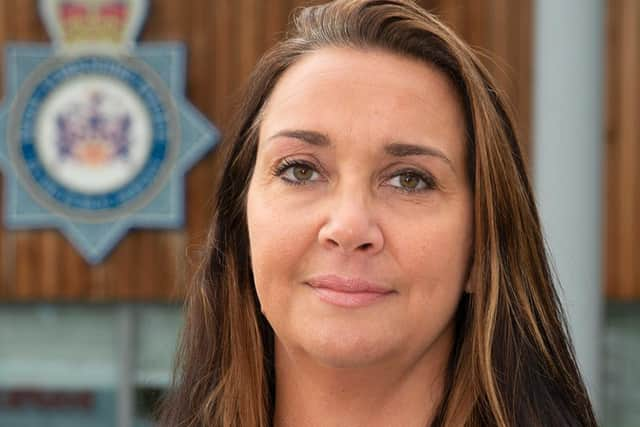'We see the impact' says police fraud unit boss as victims urged to report crime
and live on Freeview channel 276
Every one of the fraud reports coming in to West Yorkshire Police's Economic Crime Unit represents an individual person or business who could be suffering in all kinds of ways.
Ramona Senior, who heads up the team, says it ranges from people feeling annoyed or upset after losing small sums to businesses pushed to the brink of collapse.


Advertisement
Hide AdAdvertisement
Hide Ad"We see the impact," she said. "This is not just about someone who lost their life savings. This is about vulnerable people being targeted; businesses that employ people within our communities and fall foul of a scam then having to close.
"We have people having a significant impact on their family life, their financial and physical health. There are pension and investment frauds where people haven't even told their family; they're managing all that stress and strain.
"What we try and educate people and raise awareness around is that impact is a very personal thing. I may be able to stand the loss of £5,000 but for some individuals it could be everything someone's got."
The specialist team she leads tackles the most serious economic crime in terms of value and risk, with district level teams also investigating cases.


Advertisement
Hide AdAdvertisement
Hide Ad"We investigate a wide range of fraud, corruption and money laundering," Ms Senior said. "They may be high risk because of the volume, the value lost or complexity in terms of the nature of the fraud.
"We also provide a lot of advice and support for officers. We're trying to expand the reach of our expertise within economic crime and look at how we can reach the most people."
The unit acts as the assessment hub for all crimes referred on for investigation by Action Fraud, the national fraud and cyber crime reporting centre.
Investigators will review cases and seek to bring prosecutions wherever possible, support victims through the process and carry out prevention work in communities.


Advertisement
Hide AdAdvertisement
Hide AdMs Senior said: "As well as Action Fraud, we have a large amount of calls to service. There's a crime in action, the suspect is in the vicinity or someone he's targeting his vulnerable. It's where we would have a local police response and actually we would report it to Action Fraud."
Also in crime: Five ways you can support our Stop The Scammers campaign
As our lives increasingly move online, it has opened up new opportunities for fraudsters to target people from anywhere in the world.
"The nature of fraud means that we will have potentially a large number of victims that may not reside in West Yorkshire or suspects that don't reside in West Yorkshire, or a bit of both," Ms Senior said.
Advertisement
Hide AdAdvertisement
Hide Ad"We have a lot of people in Europe and eastern Europe that target victims through cyber-enabled fraud. If that individual is in Russia, it's extremely unlikely we're going to be able to get that money back and make a prosecution.
"The emergence in recent years of cyber crime makes it incredibly difficult at times. I think we have to be honest with people, support them through the crime but also be educating these people and everyone else.
"I think technology is enabling criminals to conduct a larger volume of crime more easily. Phishing emails can be sent to 10,000 or 100,000 recipients. If they get a small take up, their still making an incredible amount of money."
None of this means that the 'traditional' conman who turns up at someone's door, calls their home or sends a constant barrage of postal scams is a thing of the past though.
Advertisement
Hide AdAdvertisement
Hide AdMs Senior said: "In terms of your cold calling, people do still ring victims up. Older people are still vulnerable in that regard.
"We have what we could call our normal business at all times - lots of volume around online shopping, people buying things and paying for things through unregulated means. We also have romance fraud, mandate and invoicing fraud, and investment fraud, particularly around pensions. They're there all the time."
Evolving technologies and overseas criminals are not the only challenges faced by investigators as they seek to bring those responsible to justice.
The duration of a scam or how long ago it took place can throw up issues around the gathering and retention of evidence, while securing evidence from very vulnerable victims and delays in the judicial process can present difficulties too.
Advertisement
Hide AdAdvertisement
Hide AdMs Senior said: "We're constantly in contact with the victims and it's difficult sometimes to provide updates. It feels like a never-ending process at times for victims, I'm sure.
"In other cases, it can be relatively straightforward and quite quick."
When it comes to educating the communities, it's not just about raising awareness among the potential victims.
A lot of preventative work takes place with community groups, hospital staff and organisations like Age UK who might come into contact with more vulnerable members of society on a daily basis and could spot the signs that they are being targeted.
Advertisement
Hide AdAdvertisement
Hide AdBut there are basic steps that everyone can take, such as not giving out any personal or account details to people contacting them out of the blue and claiming to be from their bank or another organisation.
Also in crime: Five coronavirus scams and how to avoid them
The advice in that kind of scenario is always to step back and make your own direct enquiry with an organisation using the phone numbers or website you would usually use, not any links or numbers provided by those making contact.
Other sensible precautions include ensuring anti-virus software on your computer is updated and never clicking on links in unsolicited emails.
Ms Senior said these things seem really quite basic but her team sees plenty of frauds that might have been prevented if those steps had been followed.
Advertisement
Hide AdAdvertisement
Hide AdSome frauds will be far more elaborate though and it can be very difficult for less experienced people to spot the red flags.
Ms Senior said: "If someone is parting with money not of their own volition, somebody is coming to me and proactively targeting me, that's the biggest warning sign."
Whenever someone does fall foul of a scam though, it is crucial that they make a report through Action Fraud.
Those reports can help investigators to close down the avenues being used by fraudsters to target potential victims, whether it be websites, email accounts or phone numbers.
Advertisement
Hide AdAdvertisement
Hide Ad"We already know on current reporting that fraud is the most common crime in the UK," Ms Senior said. "In order to put measures in place, we must understand the full nature and extent of it.
"If people don't report then we haven't got a full picture of what's happening. We're not as able to identify emerging types of fraud and crime."
She said that focus on preventing further frauds and supporting any existing victims is reflective of the way this type of crime is being treated as a priority by the force.
"My view is that we provide a good service to our community," she said. "We're aware of the fraud types, we've done our best to prevent things - that's absolutely the key, education and prevention.
"People will always be the victim of fraud but what we can do is reduce the volume and reduce the value."
